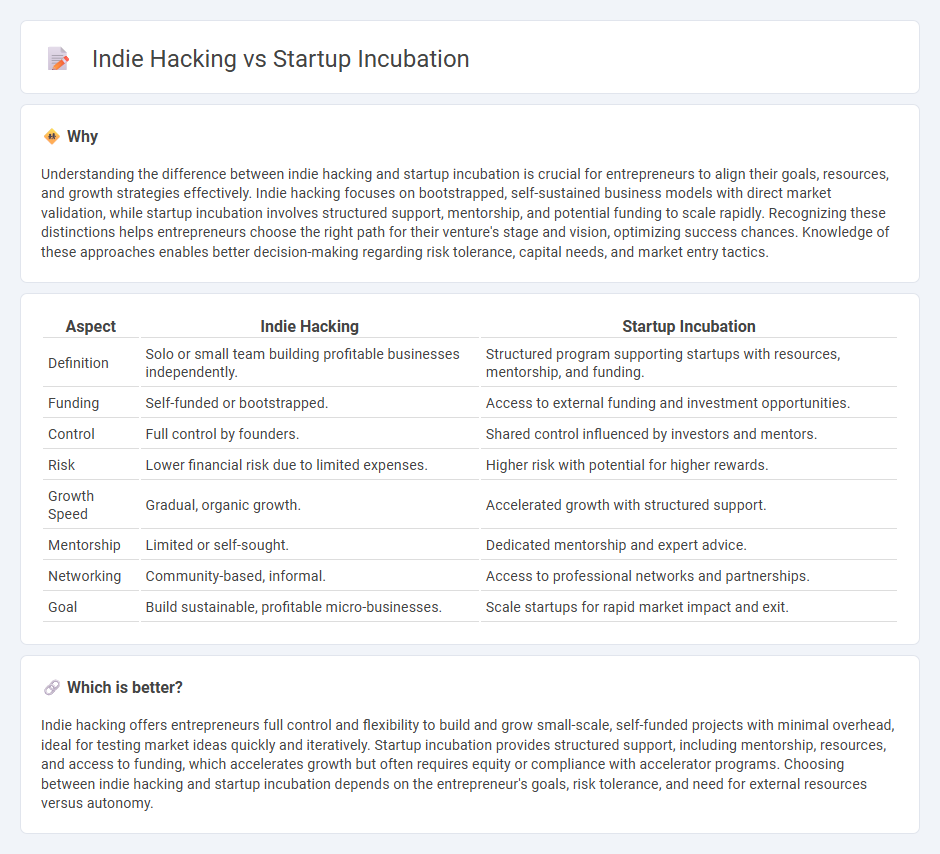
Indie hacking focuses on solo or small-team ventures aiming for sustainable, self-funded businesses, prioritizing rapid product development and direct customer feedback. Startup incubation provides structured support with mentorship, funding opportunities, and networking resources to accelerate early-stage companies' growth. Explore more to understand which path aligns best with your entrepreneurial goals.
Why it is important
Understanding the difference between indie hacking and startup incubation is crucial for entrepreneurs to align their goals, resources, and growth strategies effectively. Indie hacking focuses on bootstrapped, self-sustained business models with direct market validation, while startup incubation involves structured support, mentorship, and potential funding to scale rapidly. Recognizing these distinctions helps entrepreneurs choose the right path for their venture's stage and vision, optimizing success chances. Knowledge of these approaches enables better decision-making regarding risk tolerance, capital needs, and market entry tactics.
Comparison Table
| Aspect | Indie Hacking | Startup Incubation |
|---|---|---|
| Definition | Solo or small team building profitable businesses independently. | Structured program supporting startups with resources, mentorship, and funding. |
| Funding | Self-funded or bootstrapped. | Access to external funding and investment opportunities. |
| Control | Full control by founders. | Shared control influenced by investors and mentors. |
| Risk | Lower financial risk due to limited expenses. | Higher risk with potential for higher rewards. |
| Growth Speed | Gradual, organic growth. | Accelerated growth with structured support. |
| Mentorship | Limited or self-sought. | Dedicated mentorship and expert advice. |
| Networking | Community-based, informal. | Access to professional networks and partnerships. |
| Goal | Build sustainable, profitable micro-businesses. | Scale startups for rapid market impact and exit. |
Which is better?
Indie hacking offers entrepreneurs full control and flexibility to build and grow small-scale, self-funded projects with minimal overhead, ideal for testing market ideas quickly and iteratively. Startup incubation provides structured support, including mentorship, resources, and access to funding, which accelerates growth but often requires equity or compliance with accelerator programs. Choosing between indie hacking and startup incubation depends on the entrepreneur's goals, risk tolerance, and need for external resources versus autonomy.
Connection
Indie hacking and startup incubation share a core focus on nurturing early-stage ventures through lean methodologies and resource optimization. Indie hackers often leverage startup incubators to access mentorship, funding, and networking opportunities that accelerate product development and market validation. This symbiotic relationship fosters innovation by blending the autonomy of indie creation with the structured support of incubator ecosystems.
Key Terms
**Startup Incubation:**
Startup incubation provides structured support including mentorship, funding access, and office space to help early-stage companies scale efficiently. Incubators often offer networking opportunities and business development resources, accelerating growth through validated market strategies and investor connections. Explore the comprehensive benefits of startup incubation to unlock your venture's full potential.
Mentorship
Startup incubation programs offer structured mentorship from experienced entrepreneurs and industry experts, providing tailored guidance, networking opportunities, and access to resources crucial for scaling a business. Indie hacking involves a more self-directed approach, where mentorship is often informal, sourced from online communities or peers, emphasizing autonomy and rapid experimentation. Explore detailed comparisons to understand which mentorship style aligns better with your entrepreneurial goals.
Funding
Startup incubation typically involves structured funding opportunities from venture capitalists or angel investors, providing startups with financial resources, mentorship, and access to networks. Indie hacking often relies on bootstrapped funding, with founders self-financing or using revenue generated from initial sales to grow their projects independently. Explore how funding strategies impact growth and autonomy in both approaches.
Source and External Links
What is a startup incubator and how does it work? - NEWS BBVA - Startup incubators support entrepreneurs primarily in the very early 'pre-seed' phase by guiding them through selection, pre-incubation, incubation, and post-incubation stages to develop business ideas and prepare startups for market launch rather than immediate profitability.
How a Business Incubator Program Can Help Your Startup Grow | CO - Business incubators typically provide startups with workspace, seed funding, mentoring, training, and professional services (like legal and accounting), starting with an application and interview process to select businesses they support in their infancy.
Startup Incubator vs. Accelerator: Which Is Right for You? - Startup incubators help refine high-potential ideas over long terms (1-5 years), offering resources like workspace, mentorship, legal advice, and sometimes funding with a stake, often operating locally and focusing on developing product-market fit and business models.
 dowidth.com
dowidth.com